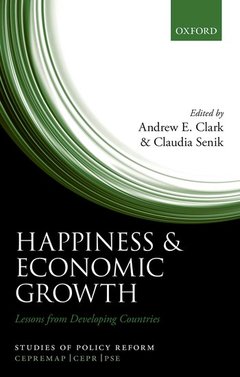Happiness and Economic Growth Lessons from Developing Countries Studies of Policy Reform Series
Langue : Anglais
Coordonnateurs : E.Clark Andrew, Senik Claudia

This volume, arising from a PSE-CEPREMAP-DIMeco conference, includes contributions by the some of the best-known researchers in happiness economics and development economics, including Richard Easterlin, who gave his name to the 'Easterlin paradox' that GDP growth does not improve happiness over the long run. Many chapters underline the difficulty of increasing well-being in developing countries, including China, even in the presence of sustained income growth. This is notably due to the importance of income comparisons to others, adaptation (so that we get used to higher income), and the growing inequality of income. In particular, rank in the local income distribution is shown to be important, creating a beggar-thy-neighbour effect in happiness. Wealth comparisons in China are exacerbated by the gender imbalance, as the competition for brides creates a striking phenomenon of conspicuous consumption on the housing market. Policy has to be aware of these effects. This applies in particular to those who try to use self-reported subjective well-being in order to generate a 'social subjective poverty line', which is a key issue in developing countries. However, the news is not only bad from the point of view of developing countries. One piece of good news is that GDP growth often seems to go hand-in-hand with lower happiness inequality, and thereby reduces the risk of extreme unhappiness.
Andrew E. Clark is a CNRS Research Professor at the Paris School of Economics (PSE). He previously held posts at Dartmouth, Essex, CEPREMAP, DELTA, the OECD, and the University of Orléans. His work has largely focussed on the interface between psychology, sociology and economics; in particular, using job and life satisfaction scores, and other psychological indices, as proxy measures of utility. The broad area is social interactions and social learning. Professor Clark is a member of the Editorial Boards of: Journal of Happiness Studies, Revue d'Economie Politique, British Journal of Industrial Relations, Review of Income and Wealth, Applied Economic Perspectives and Policy, International Review of Economics, Italian Economic Review, Evidence-based HRM, and the International Journal of Happiness and Development. Claudia Senik is Professor at the University Paris-Sorbonne and at the Paris School of Economics. She is also member of the IZA. Her main research interest is in the Economics of Happiness. A large part of her work focuses on the relationship between income, income distribution and subjective wellbeing. She frequently appeals to a comparative approach, based on the different environments in Western versus Eastern Europe. She is in charge of several international scientific cooperation programs related to her field of research. Professor Senik is a member of the editorial board of the International Journal of Wellbeing, Associate Editor of the IZA Journal of Labor Economics, and a member of the Editorial Review Board of Applied Research in Quality of Life. See her personal webpage: http://www.parisschoolofeconomics.eu/fr/senik-claudia/
Date de parution : 11-2014
Ouvrage de 292 p.
14.7x22.6 cm
Thème de Happiness and Economic Growth :
© 2024 LAVOISIER S.A.S.



